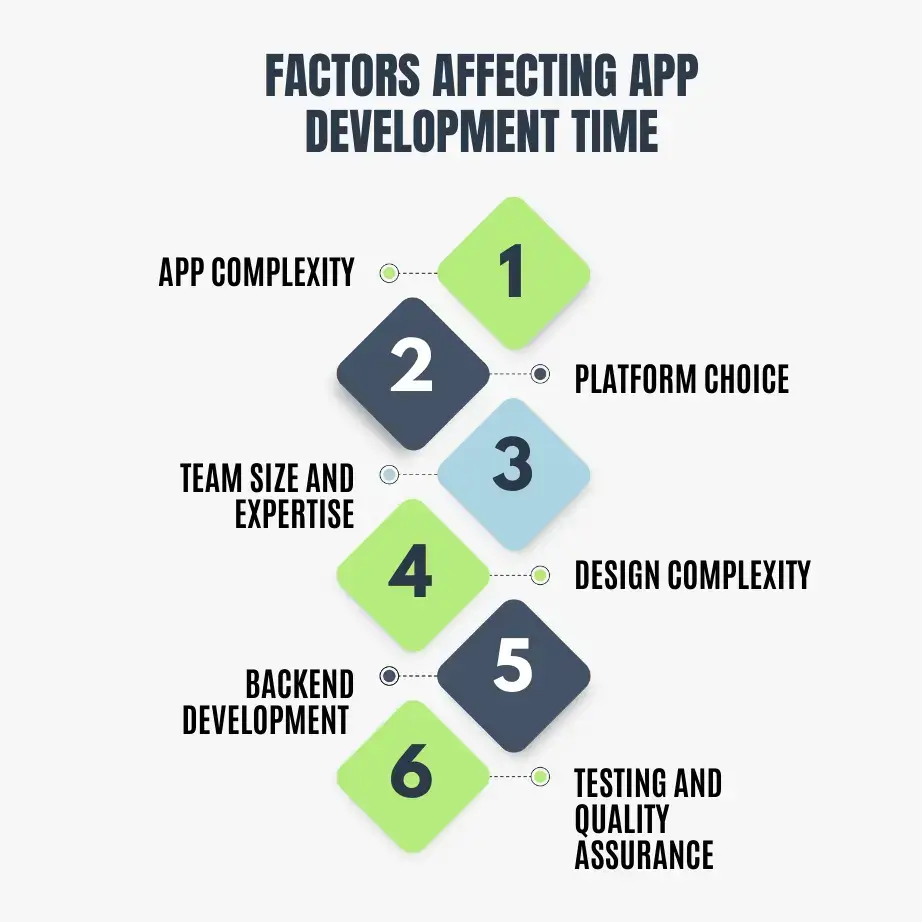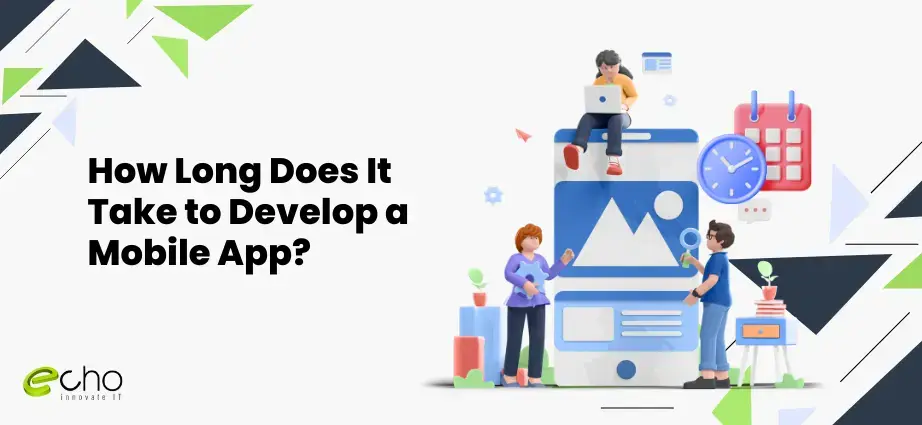You must have encountered blogs about ecommerce app development or guides to creating your mobile app. But have you ever wondered how long it takes to develop a mobile application from scratch? Developing a mobile app is a continuous process that begins with imagination and ends with launch. Understanding the app development timetable is critical for setting realistic expectations and ensuring project success.
In today’s informative blog, answer, “How long does it take to develop a mobile app?” We will also learn the factors that affect today’s development timeline (app complexities, platform choice, team size, etc.) and effective ways to “speed up the process and reduce app development costs.
So without wasting time
Let’s begin…
Understanding The Timeline of App Development
As we stated earlier, developing a mobile app is a multi-faceted process that involves various, each contributing to the overall timeline. Factors like app complexity, platform, design and user experience, development team, choice of mobile test automation framework, etc., are some of them, which we’ll discuss in the next section. For now, let’s get a general idea of the estimated time that any usual mobile app design agency will take to finish a development project:
| App Complexity | Development Time |
|---|---|
| Simple Apps | 2-4 months |
| Medium To Complex Apps | 4-6 months |
| Complex Apps | 6+ months |
As mentioned in the above table, the development time of your mobile app will solely depend on its complexity. We can categorize apps into simple, medium, and complex apps. While a simple app like timers or calculators may take less development time, a complex app like gaming or business app development can take a longer period of time.
It is crucial to note that the above estimation is quite general, and the actual development time depends on various other factors. Therefore, you can always consult with a custom mobile app development company to get a more accurate estimate for your project requirements.
Factors Affecting App Development Time

Developing a mobile app is a daunting process. Even the best mobile app developers spend more time and energy than usual maintaining the quality of their app projects. Most of us want to develop our apps in the shortest time without compromising their quality. This is what we call a “great deal”, right? Your app development may take more or less time. And so it is necessary to know factors that affect the whole timeline from both sides. With this, one can calculate the total time your mobile application may take in the future at every step in the entire app development journey. Let’s learn all the factors in detail:
App Complexity
The complexity of a mobile app significantly influences its development timeline. Simple apps, such as sucLet’s calculators, timers, and essential utilities, often have lower development times, ranging from 3 to 4 months. These applications typically have fewer functionality and need less complex coding.
Medium-complexity apps, including social media platforms, e-commerce sites, and productivity tools, have a more extensive feature set and require more advanced development techniques. Their development times are usually between 4 and 6 months.
On the other hand, complicated apps, such as on-demand services, gaming apps, and enterprise solutions, frequently incorporate elaborate features, complex algorithms, and substantial customization. These apps often have the most protracted development times, exceeding six months. Due to the increased complexity, more time is required for planning, designing, coding, and testing.
Also Check:
Platform Choice
The platform (iOS or Android) used to design a mobile app might impact development time. Each platform has its own development environment and programming language, with iOS using Swift and Android using Kotlin. These discrepancies, combined with platform-specific constraints and coding norms, might cause variations in development time.
A Cross-platform app development company may use frameworks such as React Native and Flutter, providing a solution for developers targeting iOS and Android from a single codebase. These frameworks may minimize development time by allowing you to create code once and deploy it to both platforms. However, it is crucial to note that cross-platform programming may require additional effort for platform-specific optimizations to assure maximum performance and user experience across all platforms.
Team Size And Expertise
Your development team’s size, experience, and dynamics can significantly impact how quickly and efficiently your app development project moves. Larger and more experienced teams typically have the resources and knowledge to finish projects more quickly. However, it is crucial to highlight that a larger team only sometimes results in faster development. Effective communication and teamwork within the team are critical for optimizing processes and minimizing bottlenecks.
Finding the best app developers for startups may be more challenging than it seems. The decision to deploy an in-house or outsourced development team is influenced by various factors. In-house teams may have better communication and control over the project but need more specific knowledge in certain areas. Outsourced teams can provide particular talents and experience but may require extra supervision and coordination.
Ultimately, your requirements, budget, and timetable determine the optimal option for your project. Make an informed selection by carefully assessing the strengths and weaknesses of both in-house and outsourced development teams.
Design Complexity
A well-designed user interface and user experience (UI/UX) are critical to the success of any mobile application. However, building a high-quality UI/UX can extend the development duration.
Iterative design entails numerous design iterations and feedback cycles and is critical for improving the app’s appearance and feel. While this procedure may increase development time, it is crucial for building a visually appealing and user-friendly program.
The app’s UI/UX design complexity also influences the development timeline. Complex designs with intricate layouts, animations, or bespoke elements may take longer to develop.
Backend Development
While less visible to end users, backend development is critical to establishing a mobile app’s total development timeline. The backend manages data storage, retrieval, processing, and server-side logic.
A complicated backend that includes consapp’sble data processing, interfaces with third-party systems, and real-time functionality can dramatically increase development time. Factors such as backend technology selection, database design, and server-side logic complexity influence the entire project timeline.
As a result, it is critical to thoroughly analyze your mobile app’s backend requirements and set aside adequate time and resources for backend development. A well-designed and efficient backend can lead to a shorter development time and a more robust and scalable app.
Testing And Quality Assurance
Thorough testing is required to guarantee that a mobile app works properly, is bug-free, and offers a great user experience. However, extensive testing can extend the development timeline.
Various forms of testing are commonly performed during the app development process. Unit testing entails testing individual app components or modules. Integration testing verifies how various components interact with one another. User acceptability testing determines whether the application matches the defined requirements and user expectations.
Performance testing assesses an app’s performance, responsiveness, and resource utilization under various load scenarios. Automation tools can streamline the testing process. Solutions can automate repeated testing operations, minimizing manual labour and perhaps speeding up the testing process. However, installing and configuring automation technologies can extend the duration of development.
Tips To Effectively Boost Speed Of Your Mobile App And Reduce Cost
The whole process of mobile app development can be time-consuming. With growing competition in the modern app market, where survival is usually of the fittest, business owners are always looking for top Android or iOS app development services that can deliver faster results without affecting the quality of their projects. Below are some common tips you can use or refer to boost your app development project and reduce cost simultaneously. Check them out:
- Reduce your app’s size and load time by compressing photos without sacrificing quality.
- Reduce the number of network requests to boost app performance.
- Choose languages and frameworks known for their performance and efficiency.
- Keep your app updated with the most recent software and security fixes to maintain peak performance.
- To deliver a consistent user experience, ensure your app operates properly across several devices and network circumstances.
- Use analytics tools to monitor app performance and find areas for improvement.
- Continuously monitor your app’s performance and make required adjustments to save money and improve user experience.
- Consider outsourcing development to experienced teams in areas with app’s-cheaper labour costs.
Also Check:
Conclusion
In conclusion, we can say that the development time for a mobile app may vary based on the factors mentioned above. By clarifying the given information, you can ensure a smoother development process for your future projects without worrying about the time factor.
If you want extended development durations for prior projects, Echoinnovate IT can help you reduce development time and deliver your projects as quickly as possible. We are a top iOS and Android application development company with a team of professionals with the necessary abilities and experience to expedite the development process, maximize performance, and assure timely delivery.
Choose us for your next mobile app development project and discover the difference. We are dedicated to providing excellent quality, effective development, and prompt delivery.
FAQs
How do AR and VR enhance user experience in app development?
AR and VR create immersive, interactive environments, making apps more engaging and lifelike, thereby revolutionizing user experience.
What are some common applications of AR and VR in mobile apps?
AR and VR are used in gaming, virtual tours, education, and e-commerce, offering users enhanced interactivity and visualization.
How can businesses benefit from integrating AR and VR into their apps?
Businesses can increase user engagement, improve brand loyalty, and offer unique, immersive experiences that set them apart from competitors.
What challenges might developers face when implementing AR and VR in apps?
Developers may face challenges like high development costs, hardware limitations, and the need for specialized skills to create seamless AR/VR experiences.



